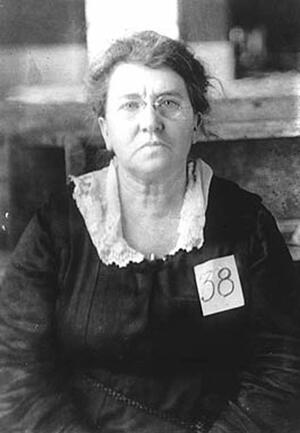Emma Goldman's "What I Believe"
Emma Goldman's deportation portrait, 1919. In post-World War I America, foreigners and their "foreign ideas" were increasingly untolerated. Following her release from prison in 1919, Goldman was immediately re-arrested on the order of J. Edgar Hoover, then director of intelligence for the U.S. Justice Department. Hoover persuaded the courts to deny Goldman's citizenship claims, thus making her liable to deportation under the 1918 Alien Act, which allowed for the expulsion of any alien found to be an anarchist. On December 21, 1919, Goldman and 248 other foreign-born radicals were deported to the Soviet Union.
Courtesy of the Emma Goldman Papers, University of California, Berkeley.
"It is too bad that we no longer live in the times when witches were burned at the stake or tortured to drive the evil spirit out of them. For, indeed, Emma Goldman is a witch! True, she does not eat little children, but she does many worse things. She manufactures bombs and gambles in crowned heads. B-r-r-r!" Thus ran the first paragraph of Emma Goldman's personal manifesto, What I Believe, published by the New York World on July 19, 1908. Written in response to "widespread public misconceptions about anarchism," the article systematically combated slanders against Goldman and outlined her anarchist approach to issues of property, government, militarism, free speech, the church, marriage and love, and violence.
Born on June 27, 1869, in Lithuania, Goldman experienced the czar's antisemitic policies and economic instability, which forced her family to move from Lithuania to Prussia and then to Russia in search of economic stability. These displacements and her distaste for the role of women in traditional Jewish families led Goldman to immigrate to America when she was sixteen. While working as a garment worker she became involved in the labor movement. Most tellingly, the trial, conviction, and execution, on specious evidence, of a group of anarchists for an 1886 bombing in Haymarket Square in Chicago inspired her to become an anarchist activist.
In "What I Believe," Goldman sought to explain and defend her struggle for "freedom in the large sense of the word" through anarchism. The struggle for universal freedom served as the basis for her radical critique of property and capitalism: "It is the private dominion over things that condemns millions of people to be mere nonentities...who pile up mountains of wealth for others and pay for it with a gray, dull and wretched existence for themselves." Since in her opinion government did nothing to further individual liberty or social harmony, Goldman saw it as nothing more than a protector of property and monopoly, and thus as an obstacle to freedom.
Goldman's article also spoke out against the growing tendency of militarism that she viewed as "the most merciless, heartless and brutal [spirit] in existence." She stood particularly opposed to militarism because she believed that the military must necessarily be antidemocratic and antithetical to freedom. In Goldman's view, anarchism advocated for peace by offering a call for universal human brotherhood and solidarity rather than dividing people into economic and political rivals requiring military protection.
Just as she saw the government as an invasive institution based on economic inequality, Goldman saw the institution of marriage in the same way. Making sure to differentiate between marriage and love, Goldman felt that marriage prevented a woman's freedom. She wrote, "marriage, or the training thereto, prepares the woman for the life of a parasite, a dependent, helpless servant, while it furnishes the man the right of a chattel mortgage over a human life."
Goldman's radical views on marriage, as well as on religion, which she called "a nightmare that oppresses the human soul and holds the mind in bondage," and on other topics, brought her renewed criticism. In February, a few months before Goldman's manifesto, a Washington Post editorial had called her "a menace" with "enormous powers of hate...set against law and order and government." Already under constant police harassment for their views, Goldman and her anarchist allies suffered further interference with their public lectures in the following months. At a New York City rally for the unemployed in September, 1908, for example, Goldman's comrade Alexander Berkman was arrested; Goldman herself fled the hall just ahead of the police.
Ultimately, Goldman's vocal endorsement of anarchism and opposition to World War I would lead to her arrest, denaturalization, and deportation under the 1918 Alien Act, which authorized the expulsion of any alien found to be an anarchist. Sent to Russia in 1919, Goldman soon became disillusioned with the Bolshevik regime. Throughout the rest of an itinerant life, Goldman continued to advocate through speech and writing for the possibility of a more just world. She died in Canada on May 14, 1940, and was buried in Chicago.
Sources: Alix Kates Shulman, ed., Red Emma Speaks: An Emma Goldman Reader (New York, 1983); Jewish Women in America: An Historical Encyclopedia, pp. 526-530; dwardmac.pitzer.edu/Anarchist_Archives/goldman/whatibelieve.html; jwa.org/womenofvalor/goldman/; sunsite.berkeley.edu/Goldman/Exhibition/; New York Times, September 8, 1908; Washington Post, February 29, 1908.




She made a real difference
In reply to <p>She made a real difference by bob
Yup.